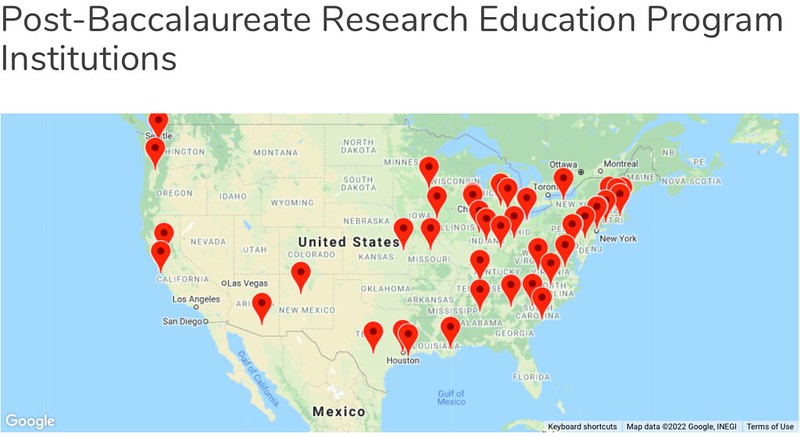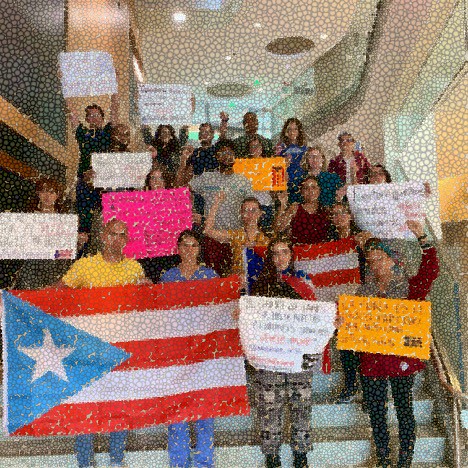GRAD SCHOOL DIARIES
post-bac research applications underrepresented minority community women
What is a post bac? My experience in PREP
Post by afloresbonilla A chance to breathe: an introduction to post-bac programs
Application season for most graduate school programs may be over, but there is still time to apply for a different kind of program! Post-baccalaureate programs can provide critical academic research experience, bridging any gaps in your education and giving you hands-on experience with your topic of interest, and ideally boosting your confidence in conducting research. Additionally, these programs give you invaluable time to consider and develop your career path, apply for fellowships, and write and publish original research. Most importantly, these programs give you the opportunity to find a community of mentors and scholars who want to support you and your journey in STEM every step of the way.

Fig 1. Post-Baccalaureate Research Education Program Institutions located in the mainland U.S. *Source: National Institute of General Medical Sciences via Google Maps.
Breaking the mold: the need for equal representation in STEM
Commonly known as a “post-bac”, the Post-Baccalaureate Research Education Program (PREP) and similar programs are most commonly supported by the National Institutes of Health (NIH). These programs assign one-year – and in the case of some programs, two-year – research apprenticeships at participating academic institutions that can be found all over the United States (Fig. 1) [1] . Furthermore, these post-bac programs were specifically developed for the enhancement and retention of graduates from underrepresented minority groups in the biomedical research fields. Such groups include a certain sex, various racial/ethnic groups, those with disabilities, or those who come from disadvantaged backgrounds, as defined by NIH [2]. Post-bac programs aim to support these communities by providing extensive research training and academic preparation to pursue higher degrees [3]. The development of these post-bac programs resulted from research conducted by the National Science Foundation (NSF) found that individuals belonging to certain groups, and especially women, “face particular challenges at the graduate-level” for retention and success and face even more challenges at the senior faculty level at doctorate-granting research institutions (Fig. 2) [2]. For science to achieve breakthroughs in the understanding of disease and develop precise, safe, and effective treatments, new and unconventional ideas are needed to challenge the status quo. PREP is not just for those with biomedical interests though! Since understanding health and disease benefits greatly from basic science research in all STEM fields, as long as there is potential for a biomedical application within the interests of NIH, you can study it via PREP.

Figure 2. Academic STEM Career Progression by Gender and Race in the U.S. *Source: Heather Metcalf and Aspen Russell via Association for Women in Science.
Benefits of PREP: what can it do for you?
As I mentioned, post-bac programs are a great way to gain a variety of experiences and skills important not just for your career in STEM but also for your personal development. A post-bac is a great way to step outside of your academic mindset and just have time to breathe. The academic requirements are tailored to your unique needs, and it is not the sole focus of the program. Most likely the post-bac program will start around mid-June to early July, which will give you time to get adjusted to the new campus, research building, laboratory, and all the people you will engage with - your post-bac cohort, your graduate near-peer mentors, program coordinators, professors, and your colleagues in the lab which can range from high school students all the way to senior/staff scientists and your principal investigator (PI). From there, you will find interesting research topics, people who will help in your fellowship or graduate school applications, and professors whose classes you might want to take. Take this time to ask yourself what it is that you truly want to pursue and engage with others to take in new perspectives and new paths you have not thought of before. This will inform whether you will pivot to a new field, research topic, or technique and adjust what courses or workshops you will need to complete to achieve this. Note: for those of you who are 100% sure of your field of interest, I would still suggest taking this time to learn new topics, expand your interests, and learn new techniques. This will greatly enrich both your professional and personal experience and you might just bring something new to your favorite field.
Through the looking glass: my reasons to apply for PREP
I applied to the University of Massachusetts Amherst PREP three years ago after not being able to get into the graduate programs that I applied to during my senior year as an undergraduate. This was the case even after completing three amazing internships at research institutions and three additional research experiences at a medical school in my hometown, each supplementing my experiences presenting research talks and poster presentations at both local and national conferences (Fig.3). In terms of quantity, this should have been more than enough for a successful graduate school application, right? Well, actually no. Even with these experiences, I noticed gaps in my research profile as a result of the short duration of summer internship programs, hindering me from gaining pivotal experience leading and completing an independent research project. I lacked a few key components that I knew would push me over the edge for success: a scientific publication and a fellowship. Therefore, that’s exactly what I set out to achieve during my post-bac studies.

Figure 3. Highlights of my undergraduate research experiences. Source: Original from Annabelle Flores-Bonilla
So, how was my experience in PREP?
With the help of my near-peer mentor, graduate students in the Neuroscience and Behavior Ph.D. Program, the 2019 PREP cohort, and especially the workshops from the University of Massachusetts Office of Professional Development, I was able to write a successful NSF Graduate Research Fellowship Program application [4]. At the same time, my mentor/PI asked me to write for an invited review article for a special topic of Alcohol Research Current Reviews about Women and Alcohol, specifically on the topic of basic science research on sex differences in the neurobiology of alcohol use disorder [5]. This was a very new topic for me, as I have never studied or researched the effects of alcohol in the brain and I was very excited to dive head-first into the literature to overcome this challenge. Along the way, I learned new techniques to study alcohol drinking behavior in rodents and piloted a study that would eventually become my second first-author publication [6]. Without this incredibly instrumental year in PREP, I would not have had the time and opportunity to learn, research, and achieve any of it.
A chance to build community: unforgettable lessons from PREP
PREP granted me the opportunity to engage in conversation with all kinds of people from all different backgrounds (Fig. 4). The PREP community which was built on collaboration, mutual support, and engagement (both at the graduate level and senior faculty/PI level) helped me figure out what kind of researcher I wanted to be and gave me the tools to develop my career. I also applied to graduate schools during this time; thanks to the professional development workshops (writing personal/research statements, CV/résumé writing, mock interviews, elevator pitch, and 5-minute thesis presentations) provided by the PREP program I secured additional scholarships in two graduate school programs I received offers from. Something that I had worked so hard for finally pulled through, and now I had everything that I needed for the next step of my career. If my story resonated with you in any way, I would encourage you to check out the links provided in the references in order for you to apply and experience everything PREP has to offer for yourself.

Figure 4. Community and Solidarity. Source: Original from Annabelle Flores-Bonilla
Dedicatory: I want to acknowledge and give thanks to the Leadership Team of the University of Massachusetts 2019 PREP program: Sandra (Sandy) Petersen, Ph.D., Lynmarie Thompson, Ph.D., Shelly Peyton, Ph.D., Carly Hutchinson, Ph.D., and Vanessa Hill.
References:
[1] National Institute of General Medical Sciences. Post-Baccalaureate Research Education Program Institutions. https://www.nigms.nih.gov/maps/Pages/Post-Baccalaureate-Research-Education-Program-Institutions.aspx.
[2] National Institutes of Health. Notice of NIH’s Interest in Diversity. Last modified November 22, 2019. https://grants.nih.gov/grants/guide/notice-files/NOT-OD-20-031.html.
[3] National Institute of General Medical Sciences. Postbaccalaureate Research Education Program (PREP) (R25). https://www.nigms.nih.gov/training/PREP.
[4] National Science Board Members. National Science Foundation Graduate Research Fellowship Program. https://nsfgrfp.org/resources/about-grfp/.
[5] Flores-Bonilla, Annabelle, and Heather N. Richardson. “Sex Differences in the Neurobiology of Alcohol Use Disorder.” Alcohol Research Current Reviews 40, no. 2 (October 8, 2020). https://doi.org/10.35946/arcr.v40.2.04.
[6] Flores-Bonilla, Annabelle, Barbara DeOliveira, Andrea Silva-Gotay, Kyle W. Lucier, and Heather N. Richardson. “Shortening time for access to alcohol drives up front-loading behavior, bringing consumption in male rats to the level of females.” Biology of Sex Differences volume 12, no. 51 (September 15, 2021). https://doi.org/10.1186/s13293-021-00395-y.
